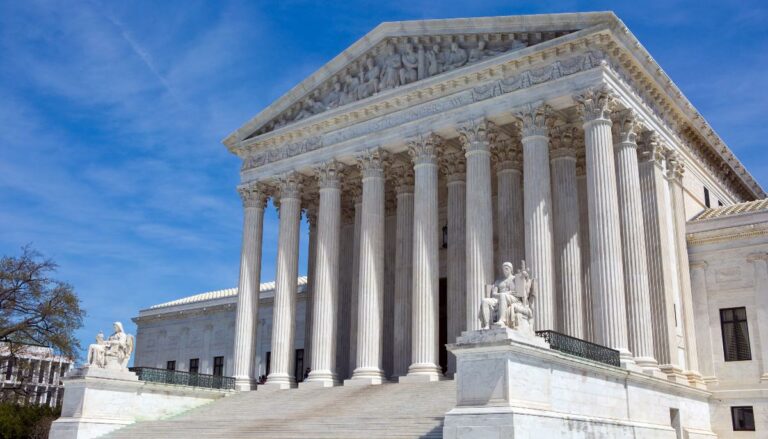The year 2020 was full of landmark Supreme Court cases: protecting LGBTQ workers, protecting DACA, as well as within the court stemming from the death of Justice Ruth Bader Ginsburg and controversy over her replacement.
Here are some of the most memorable, landmark moments for the US Supreme Court in 2020.
June 2020: Supreme Court rule civil rights laws protect LGBTQ workers
In what has been called a landmark case, on Monday, June 15, 2020, the Supreme Court ruled that existing federal law forbids, Title VII of the Civil Rights Act of 1964, job discrimination on the basis of sexual orientation or transgender status.
The ruling, by a vote of 6-3, was a major victory for advocates of gay and transgender rights. It upheld rulings from lower courts that said sexual orientation discrimination was a form of sex discrimination, NBC reported.
June 2020: Supreme Court blocks Trump from ending DACA
On Thursday, June 18, in a 5-4 decision, the Supreme Court ruled against an attempt by the Trump administration to shut down the Deferred Action for Childhood Arrivals (DACA) program, which has allowed nearly 800,000 young people to avoid deportation and remain in the U.S. known by the nickname Dreamers, they are children born in the US to illegal immigrant parents.
The problem in deporting these individuals to another country, is that they have only lived in the US. Roberts wrote that the government failed to give an adequate justification for ending the federal program, NBC reported.
July 2020: Supreme Court rules Trump cannot block release of his financial records
On Thursday, July 9, in a 7-2 decision, the Supreme Court ruled that President Donald Trump could not block prosecutors in New York from seeking his financial records. The ruling by the court was another landmark decision, one that will stand as a major statement on the scope and limits of presidential power, the New York Times reported.
“No citizen, not even the president, is categorically above the common duty to produce evidence when called upon in a criminal proceeding,” Chief Justice John Roberts wrote, adding that President Trump might still raise objections to the scope and relevance of the subpoena requesting the records.
Congress not provided the same leeway
In another major statement by the court, in a separate 7-2 decision, the court ruled that Congress could not, at least for the present time, view many of the same records, the Times reported. The court said the case should be returned to lower courts to examine whether Congress should narrow the parameters of the information it was seeking.
September 2020: Justice Ruth Bader Ginsburg dies at 87
Justice Ruth Bader Ginsburg died at her home in Washington, D.C., surrounded by her family, on Friday, September 18, 2020, at the age of 87. The cause of death was listed as complications from metastatic cancer of the pancreas, NPR reported. Ginsburg was active in the court up until her death. She was a major architect in the fight for women’s rights beginning in the 1970s.
“Our nation has lost a justice of historic stature,” Chief Justice John Roberts said. “We at the Supreme Court have lost a cherished colleague. Today we mourn but with confidence that future generations will remember Ruth Bader Ginsburg as we knew her, a tireless and resolute champion of justice.”
September 2020: Trump nominates Amy Coney Barrett to replace Ginsburg, major controversy erupts
On Saturday, September 26, President Donald Trump announced he had selected Amy Coney Barrett as his choice to fill the Supreme Court seat vacated by the late Justice Ruth Bader Ginsburg, Fox reported.
Barrett, a judge on the 7th Circuit Court of Appeals, is also a Notre Dame law professor
Trump’s decision set off a wave of controversy, as Democrats and liberals feared the nomination of the conservative Barrett would shift the court into a conservative majority, having an effect for decades.
Another complaint by liberals was that with the nomination coming so close to the November election, the choice to fill the Supreme Court seat should be left to whichever candidate won the presidential election in November.
MoveOn.org created a petition to try to prevent a nominee from being confirmed before the November election, citing it was the dying wishes of Ruth Bader Ginsburg that her seat not be filled until after Election Day.
October 2020: Senate confirms Amy Coney Barrett to Supreme Court
On Monday, October 26, the Senate voted 52-48 to confirm Amy Coney Barrett to the Supreme Court, giving the highest legal body in the land a conservative majority. Barrett became the third justice nominated to the High Court by President Donald Trump, Fox reported.
The move cemented Trump’s legacy in presidential history books. The last president to nominate three justices to the Supreme Court was Ronald Reagan over two terms, and Trump did it in one.
November-December 2020: Court upholds freedom of religion, ruling against some lockdown restrictions on churches
In separate rulings, the Supreme Court ruled in favor of freedom of religion. In late November, in a 5-4 decision, the court struck down some restrictions on religious services in New York, ruling that the limits on in-person worship violated the First Amendment’s protection of the right to free exercise of religion, NPR and Fox reported.
In early December, the Supreme Court ruled against lockdown orders imposed by California Governor Gavin Newsom, vacating a District Court ruling against Harvest Rock Church in Pasadena, California with instructions to reconsider their challenge in light of the Supreme Court’s recent rejection of restrictions on prayer services in New York.





